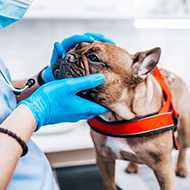Brachycephalic dogs at highest risk of skin fold dermatitis

Findings revealed that english bulldogs were x49.1 per cent more at risk, French bulldogs x25.9 per cent and pugs x16.16.3 per cent.
Researchers at the Royal Veterinary College (RVC) have discovered that brachycephalic dog breeds are at the highest risk of skin fold dermatitis.
Undertaken by the RVC's VetCompass Programme, the study searched the anonymised veterinary clinical records of more than 900,000 dogs under veterinary care in the UK for instances of skin fold dermatitis to determine which breeds are more at risk.
Caused by friction, excessive moisture and lack of ventilation deep in folds of skin, skin fold dermatitis ranges from reddened to infected to ulcerated skin, often resulting in pain.
Searching the clinical records, researchers discovered that one in 300 dogs per year were diagnosed, with brachycephalic breeds far more predisposed to the condition.
Dr Dan O'Neill, lead author of the paper, said: “As humans, we hold the power to ensure that every pet dog starts life with good natural health.
“When choosing which dog to own, this means selecting a breed that does not have extreme conformations such as folded skin which can lead to a lifetime of painful skin infections.”
The breeds diagnosed with the highest proportion of skin fold dermatitis per year were English bulldogs (6.1 per cent), French bulldogs (2.7 per cent) and pugs (2.1 per cent)m with 1 per cent of brachycephalic dogs affected per year.
In comparison, only 0.3 per cent skin fold contact dermatitis was recorded in breeds with typical medium-length skulls.
Dr O'Neill continued: “This study adds to the growing evidence of the substantial harms that extreme body shapes can have on our dog’s health and will hopefully encourage prospective owners to ‘stop and think’ about avoiding extreme body shapes before choosing which breed to purchase.”
Researchers also identified the most common locations on dogs' bodies for the condition to occur, with the lip (36.8 per cent), facial folds (22 per cent), vulva (14.2 per cent), nasal fold (9 per cent), tail (5.8 per cent) and periocular fold (3.5 per cent) most likely to be affected.
Co-author of the paper, Dr Anke Hendricks, commented on the importance of the condition being understood: “Skin fold dermatitis is a common problem in dogs with skin folds or pockets. It is not always easy to spot where folds are deep, nor is it necessarily recorded in the health records, and as such this study is likely to underestimate the problem.
“Prevention or treatment of infection requires very frequent skin care or medication throughout a dog’s life and adds a considerable care burden and cost to living with an affected dog.”
Alongside the discovery that brachycephalic dogs were more likely to be affected by skin fold dermatitis, other key findings include that basset hounds, cocker Spaniels, shar peis, Cavalier King Charles Spaniels and Boxers also had a higher predisposition for skin fold dermatitis.
It was also found that English bulldogs, French bulldogs and pugs showed the highest levels of skin fold dermatitis in facial, nasal and periocular locations, and that the risk of diagnosis rose as dogs aged.
Health, Welfare and Breeder Services executive at The Kennel Club, Bill Lambert, urged dog owners to take the new research into consideration: “This is an important reminder that owners of dogs with wrinkles should be aware of the potential problems and know how to avoid them – by cleaning their dog’s skin folds daily, ensuring they’re kept dry and making sure their dog is not overweight.
“It is also vital that people make informed puppy buying choices and avoid those dogs that are bred for extreme wrinkles – which are far removed from what’s described in breed standards – and instead ‘stop and think’, and find a responsible breeder, who has their dogs' welfare at heart.”
Published in Scientific Reports, the full paper is available to read here.



 The Veterinary Medicines Directorate (VMD) is inviting applications from veterinary students to attend a one-week extramural studies (EMS) placement in July 2026.
The Veterinary Medicines Directorate (VMD) is inviting applications from veterinary students to attend a one-week extramural studies (EMS) placement in July 2026.